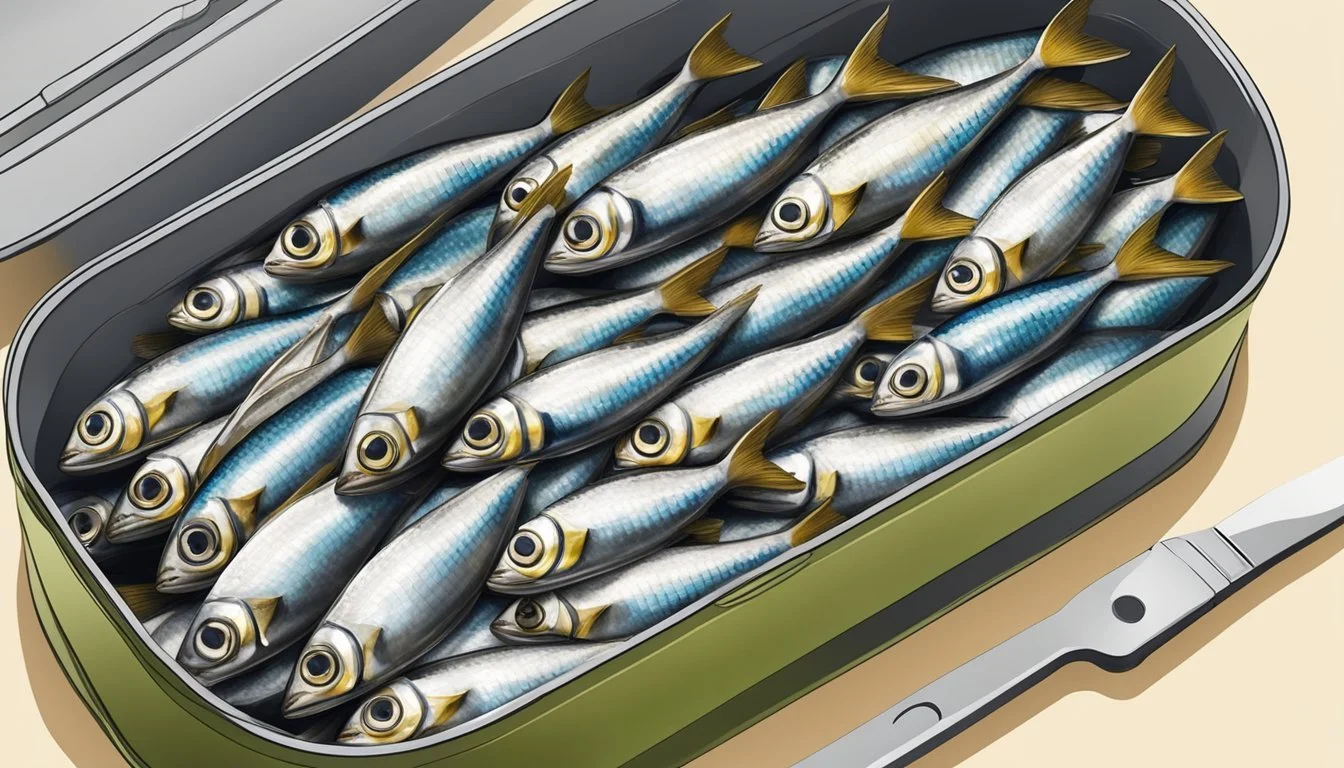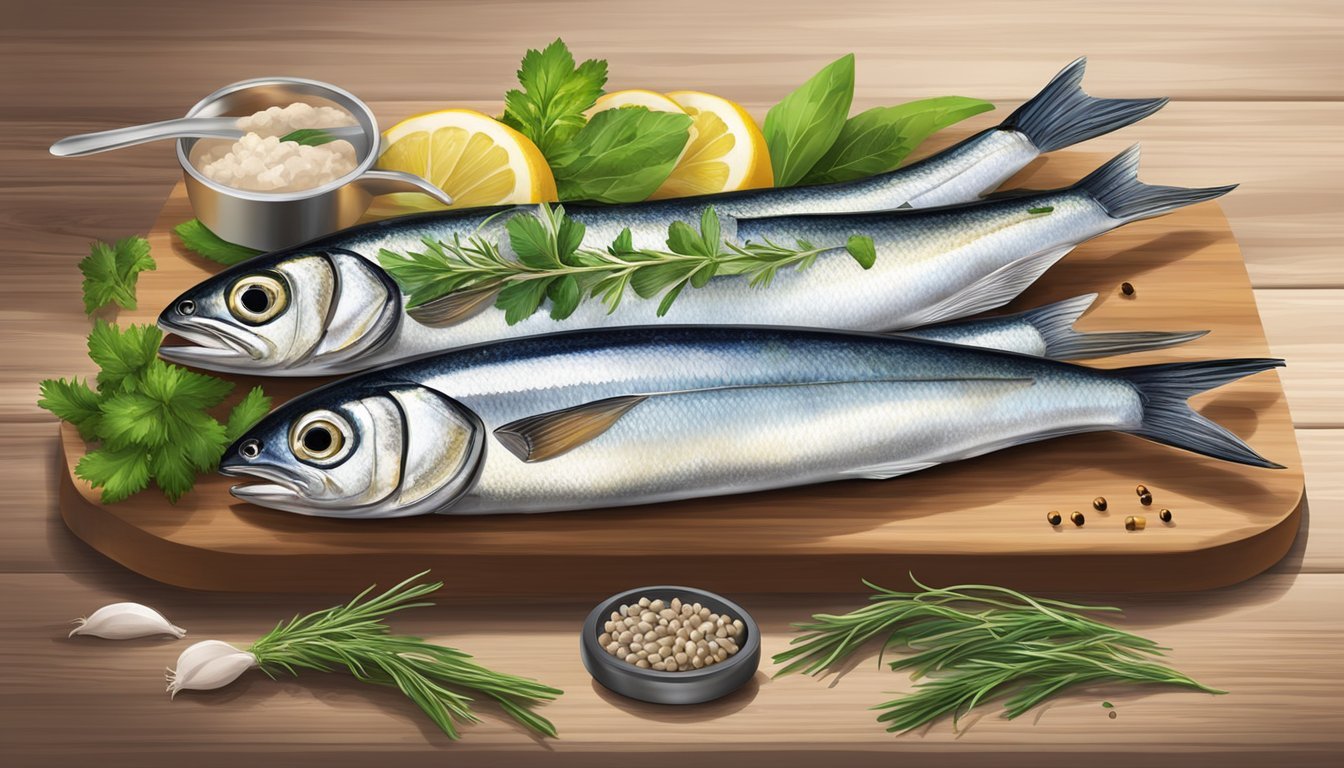What is the 72 Hour Sardine Challenge
Rules and Tips Explained
The 72 Hour Sardine Challenge is a unique dietary experiment where participants consume only sardines for three days. This challenge involves eating as many sardines as desired whenever hunger strikes, with allowances for water, black coffee, and tea. Sardines can be packed in water or olive oil and prepared to personal preference, such as pan-fried or air-fried for added crispiness.
Originating from various experiments and anecdotes shared online, the appeal of the sardine challenge lies in its simplicity and potential health benefits. Enthusiasts believe that the omega-3 fatty acids and protein content in sardines contribute to satiety and energy stability, making it a practical approach for those following a ketogenic diet or seeking to manage weight.
Participants often document their experiences, noting changes in blood sugar, ketone levels, and overall well-being. The challenge has garnered attention not just for its stringent culinary monotony but also for the curiosity it sparks about the potential metabolic and dietary impacts of such a focused nutritional regimen.
Understanding the 72 Hour Sardine Challenge
The 72 Hour Sardine Challenge has gained traction across various social media platforms like YouTube, Instagram, and TikTok. This section will provide details about its origins, outline the rules and guidelines, and explain the science behind it.
Origins and Popularity
The 72 Hour Sardine Challenge was popularized through social media, with influencers and rising YouTube stars playing a significant role. One key figure in its rise is Annette "Dr. Boz" Bosworth, an internist known for her work in the ketogenic community. Her detailed videos and posts have helped to demystify the concept and drive its popularity among health enthusiasts.
Overview of the Challenge
Participants in the 72 Hour Sardine Challenge consume only sardines for three days. There are no restrictions on the number of cans; when hungry, they simply eat more sardines. Sardines can be packed in water or olive oil but should be eaten without additional foods. The challenge allows drinking water, black coffee, and tea. The simplicity of the rules makes it approachable.
Science Behind Sardine Fasting
Sardine fasting combines the principles of fasting with the nutritional benefits of sardines. Sardines are nutrient-dense, rich in vitamins D and B, calcium, iron, and protein. This ensures that while caloric intake is restricted, the body still receives essential nutrients. The high protein content supports muscle maintenance, while the omega-3 fatty acids help improve heart health. This challenge is often linked to ketosis, a metabolic state where the body burns fat for energy, often monitored by participants through blood sugar and ketone tracking.
Nutritional Composition of Sardines
Sardines are a highly nutritious option packed with essential nutrients. This section highlights sardines’ macronutrient profile and the key vitamins and minerals they provide.
Macronutrients and Calories
Sardines are a rich source of protein and healthy fats. A typical 3.75-ounce can of sardines in oil contains:
Calories: Approximately 190
Protein: Around 23 grams
Fat: Roughly 10 grams, including omega-3 fatty acids
They offer a balanced source of macronutrients, ideal for muscle repair and cardiovascular health. The high omega-3 content benefits heart health, while the protein supports muscle maintenance and growth. Sardines are low in carbohydrates, making them a good option for low-carb diets like keto.
Vitamins and Minerals in Sardines
Sardines are high in several essential vitamins and minerals:
Vitamin D: Crucial for bone health, immune function, and mood regulation.
Calcium: Important for bone strength; a can provides about 35% of the daily value.
Iron: Supports hemoglobin production, contributing to energy levels.
Magnesium: Involved in over 300 biochemical reactions in the body.
Selenium: Offers antioxidant properties.
Vitamin B12: Vital for neurological function and energy production.
These nutrients make sardines a powerhouse for overall health, aiding in bone, muscle, and immune system support.
Health Benefits of Sardine Consumption
Sardine consumption offers several health benefits, particularly in cardiovascular health, blood sugar management, bone health, and inflammation reduction.
Cardiovascular and Blood Sugar Impact
Sardines are rich in omega-3 fatty acids, which are known to support cardiovascular health by reducing triglycerides, lowering blood pressure, and decreasing the risk of heart disease. These essential fats also have an anti-inflammatory effect that helps maintain arterial health.
The high omega-3 content can help improve blood lipid profiles, reducing bad cholesterol (LDL) and potentially raising good cholesterol (HDL). Additionally, sardines are low in saturated fats, which further supports heart health.
Consuming sardines can also stabilize blood sugar levels due to their high protein and healthy fat content, which slows down the absorption of glucose. This is particularly beneficial for individuals with insulin resistance or type 2 diabetes.
Bone Health and Inflammation Reduction
Sardines are a great source of calcium and vitamin D, both of which are crucial for maintaining strong bone health. The calcium found in sardines helps maintain bone density and reduces the risk of osteoporosis, especially in older adults.
Vitamin D in sardines enhances the body's ability to absorb calcium, providing a synergistic effect for bone strength. Inflammation in bones and joints can be mitigated by the anti-inflammatory properties of omega-3 fatty acids found in sardines.
Regular consumption of sardines can help lower chronic inflammation, benefiting overall joint health and reducing the risk of inflammatory diseases. These benefits make sardines a valuable addition to a balanced diet for both energy and inflammation reduction.
Diet Modification and Fasting Fundamentals
The 72-hour sardine challenge focuses on integrating sardines into your diet and understanding the impact on ketosis and metabolism. This section sheds light on effective diet modifications and the fundamentals of fasting during this challenge.
Incorporating the Challenge into Your Diet
The 72-hour sardine challenge requires consuming only sardines, water, black coffee, and tea. Sardines can be packed in water or olive oil and may be drained or undrained, depending on preference.
Nutrient-dense sardines provide essential vitamins such as D and B, calcium, iron, and protein. This nutrient combination helps maintain satiety and reduces the desire to consume other foods. Additionally, since they are low in carbohydrates, sardines fit well into a ketogenic diet.
Implementing this challenge involves eating sardines whenever hunger strikes, without limiting the number of cans consumed. This deliberate choice of food helps control blood glucose levels and prevents sugar spikes, fostering a more stable metabolic environment.
Understanding Ketosis and Metabolism
Ketosis is a metabolic state where the body burns fat for fuel instead of carbohydrates, producing ketones. The high-protein, low-carb nature of the sardine challenge is ideal for achieving and maintaining ketosis.
By consuming sardines, which are low in carbs, the body depletes its glycogen stores and transitions to burning fat, resulting in weight management. This shift not only reduces blood glucose levels but also promotes the production of ketones, enhancing energy levels and mental clarity.
Furthermore, fasting, as part of this challenge, stimulates metabolic processes that improve fat-burning efficiency. Intermittent fasting during the 72-hour period allows the body extended periods to remain in ketosis, thereby maximizing fat utilization and benefiting overall metabolic health.
Potential Risks and Considerations
Participating in the 72-hour sardine challenge involves certain risks and considerations. These involve mercury content, potential allergies, and the importance of dietary balance and moderation.
Mercury Content and Allergy Risks
Sardines, unlike larger fish such as tuna, generally have low mercury levels. This is crucial since mercury can be harmful, particularly to those who are pregnant or have preexisting conditions. It's advised to consume sardines instead of herring or mackerel for this challenge, as they carry a lower mercury risk.
Allergies are another concern. Seafood allergies are relatively common and can cause reactions ranging from mild to severe. Symptoms may include itching, swelling, or even anaphylaxis. Therefore, those with known fish allergies should avoid this challenge completely.
Balance and Moderation in Diet
While the sardine fast can be nutrient-dense due to the vitamins and minerals found in sardines, it is critical to consider balance. A diet consisting solely of sardines may lead to an imbalance, lacking other essential nutrients one would typically get from a varied diet.
High sodium content in canned sardines could be problematic for individuals with high blood pressure or those who are sodium-sensitive. This could potentially worsen conditions like hypertension or impact insulin resistance in those with prediabetes.
To avoid these issues, it’s recommended to incorporate breaks between such fasts and to consult a healthcare provider before beginning the sardine fast. Balancing this fasting method with other healthful dietary practices can help mitigate potential risks.
Guide to Sardine Selection and Preparation
Selecting and preparing sardines for the 72-Hour Sardine Challenge involves making informed choices about the type and packaging of sardines. It also includes discovering creative ways to incorporate sardines into meals to maintain variety.
Choosing the Best Sardines
When choosing canned sardines, consider the oil they're packed in. Sardines in olive oil are preferred for their rich flavor and health benefits. Sardines in water offer a lighter option. Both types can be drained or not, depending on personal preference.
Some sardines come in tomato sauce or mustard, which can add variety. Look at the ingredient list for additives or preservatives. Prioritize brands with minimal additives for a cleaner diet.
Buying in bulk can save money and ensure a consistent supply throughout the challenge. Keep an eye on the expiration dates to maintain the best quality.
Creative Sardine Recipes
To keep meals interesting, experiment with different ways to prepare sardines. Sardine salad is a popular choice; mix sardines with greens, a bit of lemon juice, salt, and pepper for a refreshing dish.
Sardine on toast is simple yet satisfying. Use whole-grain bread and top with sardines in olive oil, a sprinkle of seasoning, and maybe some chopped herbs.
For a richer flavor, try sardine-packed eggs. Mix sardines with beaten eggs and cook as an omelet. Black coffee and tea pair well with these meals, keeping you refreshed throughout the day.
Experimenting with different combinations of sardines and compatible ingredients ensures a pleasant experience during the 72-Hour Sardine Challenge.
Cultural and Sustainable Perspectives
The 72-hour sardine challenge offers an interesting intersection of cultural appreciation and sustainable practices. Sardines are not only rich in nutrients but also play a significant role in both economic and ecological contexts.
Economic and Ecological Significance
Sardines, part of the herring family, are a vital component of marine ecosystems and have substantial economic importance. Due to their high reproductive rates, sardines are considered a resilient species, making them a staple in sustainable fishing practices.
Compared to salmon and swordfish, sardines require less intensive farming and are less prone to overfishing. This makes them an environmentally friendly choice. The lowly sardine thus helps maintain balanced oceanic ecosystems.
On the economic front, sardines provide livelihoods for many fishing communities around the world. Their affordability and nutritional value make them an accessible food option, contributing to food security and sustainable economic growth in various regions.
Community and Success Stories
Individuals from diverse backgrounds have participated in the 72 Hour Sardine Challenge, sharing their unique experiences and the benefits they have observed.
Testimonials from Challengers
Deb Hamilton, a diabetic woman, highlighted her experience with the 3-day sardine challenge. She noted improvements in her blood sugar levels and energy. Hamilton appreciated the sardines as an inexpensive source of protein, packed with essential nutrients, including healing amino acids.
Another notable dieter, Patti Bodner, described feeling more satiated and less prone to snacking, crediting the high omega-3 content of sardines. A participant from Georgia, a grandmother, reported losing weight and a boost in mental clarity. Her success encouraged her to integrate sardines regularly into her diet.
Inspirational Accounts
Many challengers have shared their journey on platforms like MyFitnessPal and various YouTube channels. For instance, participants have reported significant weight loss, including one who lost four pounds and one percent body fat over three days.
The keto diet community has also embraced the challenge, citing improved ketosis and reduced cravings. These stories emphasize that the sardine challenge is not just about physical changes but also the mental strength gained from completing such a specific and focused dietary challenge.
Supplementary Foods and Alternatives
The 72-hour sardine challenge focuses on consuming sardines as the primary food source. However, there are other foods that can complement this challenge for those on a keto diet, along with alternatives for individuals who may not enjoy sardines. Additionally, texture and flavor preferences can be addressed to make the experience more enjoyable.
Keto-Friendly Complementary Foods
For individuals following a ketogenic diet, it is beneficial to incorporate high-fat, low-carb foods to maintain ketosis. Avocados are an excellent choice, providing essential healthy fats and fiber. Eggs can also be included, as they are rich in protein and support muscle function.
Cheese varieties such as cheddar, mozzarella, and brie offer both fat and flavor. Buttered non-starchy vegetables like broccoli and cauliflower, sautéed in olive or avocado oil, are nutritious and keto-friendly. Fatty meats like bacon can be consumed in moderation, adding both fats and desirable flavors to the diet.
Alternatives for Non-Sardine Eaters
If sardines are not appealing, other fish rich in omega-3 fatty acids can be substituted. Salmon, mackerel, and herring are excellent choices that provide similar health benefits. These alternatives support heart health and maintain the necessary intake of omega-3s.
For those preferring non-fish options, grass-fed beef or pork can be fitting substitutes. These meats are high in protein and healthy fats, essential for those on a keto diet. Additionally, nutritional supplements containing omega-3 fatty acids can also be considered to ensure adequate nutrient intake.
Addressing the Palate and Texture Preferences
Individuals who struggle with the taste or texture of sardines can enhance their meal experience by trying different preparation methods. Grilling or baking sardines may alter their texture and flavor in a more pleasing way. Incorporating sardines into a salad recipe with arugula, spinach, cherry tomatoes, and lemon vinaigrette can make them more palatable.
Adding herbs and spices like dill, parsley, garlic powder, and black pepper can significantly improve the taste. Blending sardines into pâtés or spreads for use with keto-friendly crackers can also offer a different mouthfeel and flavor profile, making it easier to consume them regularly.
I really suggest buying garlic powder and black pepper online for an easy shopping experience!
Final Considerations
The 72-hour sardine challenge, while straightforward, can have implications for your health that should not be overlooked. Consulting a healthcare professional prior to starting is advisable.
Seeking Professional Advice
Before beginning the 72-hour sardine fast, individuals should seek professional medical advice. Medical professionals can offer insights on how this diet might affect existing health conditions. A diet consisting solely of sardines may impact cholesterol levels, sodium intake, and other health markers.
Diagnosis of any underlying conditions should be confirmed and managed before undertaking such a fast.
Healthcare providers can also discuss potential side effects and suggest monitoring strategies. They might recommend supplements or modifications to ensure nutritional balance. Individuals should never disregard professional advice in favor of anecdotal success stories.
Seeking professional input ensures that the challenge is approached safely and healthily.









